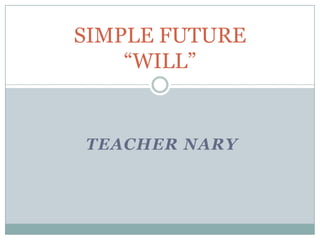
Simple future
- 1. TEACHER NARY SIMPLE FUTURE “WILL”
- 2. O FUTURO É UMA FORMA VERBAL COMUMENTE UTILIZADA PARA EXPRESSAR EVENTOS QUE AINDA NÃO ACONTECERAM, ESTANDO ESTES SITUADOS DEPOIS DO ATO DE FALA, OU DA ESCRITA. O SIMPLE FUTURE (FUTURO SIMPLES) EXPRESSA FATOS E ACONTECIMENTOS QUE PROVALVELMENTE OCORRERÃO.
- 3. O FUTURO SIMPLES EM INGÊS É CONSTRUÍDO PELO VERBO MODAL OU AUXILIAR WILL, OU PELO MENOS COMUM SHALL, SEGUIDO DO VERBO PRINCIPAL NO INFINITIVO SEM TO. NO FUTURO SIMPLES EXISTEM TRÊS FORMAS: - AFIRMATIVA - NEGATIVA - INTERROGATIVA
- 4. FORMA AFIRMATIVA Para formar uma oração no Will Future, basta colocar o verbo auxiliar “will” antes do verbo principal. Ex: I willfollowyou.= Eu te seguirei. I willdreamofyoutonight.= Eu sonharei com você esta noite. Na maioria das vezes, o “will” é utilizado na forma contrata, ou seja, abreviada. Ex: I’llgetthe = Eu não ficarei quieto
- 5. FORMA NEGATIVA Para usarmos a forma negativa, colocamos o “not” após o verbo auxiliar “will”. Ex: I think I will not travel. = Eu acho que não viajarei. Podemos fazer a forma contraida do WILL + NOT = WON'T Ex: I won't traveltomorrow. =Eu não irei viajar amanhã.
- 6. FORMA INTERROGATIVA Apenas trocar o auxiliar WILL e o sujeito de lugar, quer dizer colocar o will para o início da frase. EXEMPLO:- Will yougo? (você vai ir? / você irá?)- Will shewin? (ela vai vencer? / ela vencerá?)
- 7. EXPRESSÕES DE TEMPO USADAS NO FUTURO: Tomorrow – amanhã Thedayaftertomorrow – depois de amanhã Nextweek – próxima semana Nextweekend – próximo final de semana Nextmonth – próximo mês Nextyear – próximo ano
